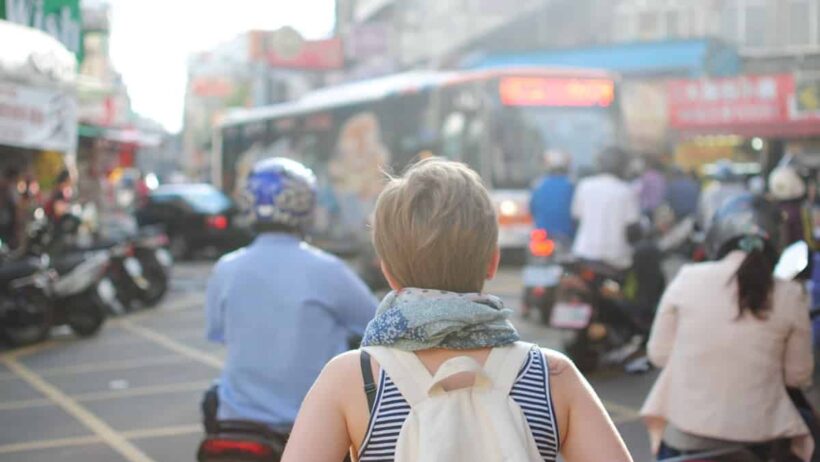Moving overseas is an exciting step. It can also be extremely daunting.
There’s so much to look forward to when moving overseas. But it’s important to realise that the first few weeks are the most difficult. Many fun experiences await, but it takes time to find accommodation, get a job, make new friends and set up your new life overseas.
The first weeks can feel lonely
Things can initially feel quite lonely, especially if you’re travelling alone or if you don’t know anybody at your new destination.
If you’re travelling overseas for a working holiday, it’s important to have realistic expectations. Before I embarked on my first working holiday, many returning travellers told me about the fun experiences they’d had and how much they’d learned along the way. But nobody told me how hard the first few weeks would be.
It’s not all sunshine and roses. You will face challenges and there will be times when you wonder whether the sacrifices you made to move abroad were worthwhile. Many people even consider packing up and returning home if they’re not having fun or things haven’t gone to plan within the first month. (Regrettably, I have met people who have given up and done just that.)
You need to expect that things won’t go exactly as you expected. You will encounter setbacks and you will probably feel lonely at times, at least initially. In 99% of cases, it is absolutely worth not giving up. Things will get better after the first few weeks, I promise! But you should be prepared to get through a tough few first weeks in the knowledge that things will get better.
There is no one-size-fits-all guide to moving to a new country. But there are a few things that you can do in the initial days and weeks to make the transition as smooth as possible!
Have somewhere to stay when you first arrive
There’s not much worse than landing in a new country after a long-haul flight where you don’t know anybody and don’t have anywhere to go!
Before you arrive, make sure that you have somewhere to stay for at least the first two weeks after moving overseas.
If you’ve already found permanent accommodation, that’s great! You’ll be able to settle in immediately and that’s one less thing to worry about after you arrive.
But the vast majority of working holiday makers wait until after they’ve arrived before searching for housing. It’s difficult to find accommodation when you’re in another country because you’re unable to inspect the property or meet your future housemates in person. You could also risk being scammed if you sign a rental contract before inspecting the property in person. In some countries, housing scams are unfortunately common.
So, if you’re planning to find housing after you arrive, that’s perfectly normal. But make sure you’ve booked temporary accommodation to cover the time it will take to find more permanent housing. This could be a bed at a hostel, hotel room or an Airbnb. Or, you could make arrangements to stay with a friend or relative while you search.
I would generally book a cheap hostel room to cover the first two weeks. If it takes longer to find a place to live, most hostels will let you extend your stay. Alternatively, some hostels will allow you to check out early and refund any remaining nights if you do. Check with the hostel if in doubt, but I’ve found that most are willing to accommodate backpackers in this situation.
If you’re moving to London, consider pre-booking a room in a Crenns Properties share house before you arrive. You can book for as little as a month, and there are options to stay longer as well.

The main thing is that you have somewhere to go when you arrive. You can then use this as a temporary base to start planning your new life.
What to do in the days after moving to a new country
Now for some practical tips when moving overseas.
Get a local phone number
One of the first things you should do after arriving is to purchase a local SIM card and put it into your phone. This may seem like a small thing, but it’s so important. Not only will it allow you to make calls and access internet data at your destination, but it will also help you to find accommodation (and later, a job).
That’s because potential landlords will be more likely to offer you housing if you have a local phone number. Not only will they find it easier to contact you, but having a local phone number also shows them that you have a connection to the country and could make them more likely to trust you. Think about it: is a landlord in France more likely to call somebody with a French or an Australian mobile number to offer them a room?

Find somewhere to live permanently
The next step, if you haven’t already, is to start looking for a place to live. This is often the most difficult and time-consuming step, especially if you don’t happen to speak the local language, but it is a necessary one. You probably won’t be able to find work – or even open a bank account – until you have a permanent address.
If you don’t speak the local language, you may find it helpful to ask a friend who does for assistance with this.
Get your paperwork in order
Most countries require you to apply for a working holiday visa before you arrive. But for some countries (such as The Netherlands), this process only starts once you’re in the country. If this applies to you, think about applying for the necessary visa as soon as possible after you arrive.
Some countries also require you to complete certain formalities like visiting the immigration office or registering with the local police after arrival.
Get help from local contacts
If you happen to know anybody in your new city, this is also a good time to get in touch with them. Having a few friends that can help you with your move, give advice and introduce you to other people is invaluable. It will also help you to avoid the initial period of loneliness that so often follows after moving overseas.
What to do after you’ve found a place to live
Once you’ve taken that leap of faith to move overseas, found somewhere to live and moved in, the hardest steps are over! But there is still a bit more to do to set up your new life overseas.
Many countries require new residents to register with the local authorities after moving in to new accommodation. Make sure you check the local rules for your city or country.
Now is also the time to start thinking about opening a local bank account, making new friends in your new city, going shopping for the things you’ll need during your stay and perhaps looking for work. For more on this, be sure to read our guide to setting up a new life overseas.
Explore, have fun and look after yourself
Sometimes, searching for housing or a job at the start of your working holiday can feel like a full-time job in itself. But don’t let it get you down!
You’ve just moved to a new city in a new country… make the most of it! Take the time to explore your new location and get to know some of the local customs. Visit some of the local tourist attractions and take a free walking tour, if that’s offered in your city. And don’t be afraid to travel around the region. After all, working is only half of the point of a working holiday!
Matt is the founder of Working Holidays for Aussies. Passionate about travel and always looking for great deals, he believes that a gap year is the perfect opportunity to immerse yourself in another culture and learn all the things they didn’t teach you in school.
Originally from Australia, Matt has travelled to over 100 countries, lived in 7 countries, and has extensive real-world experience with working holiday visas.













Hey, just after an opinion. Im planning on staying in Berlin (with a german working holiday visa) for about 3-5 months, I’m not sure exactly. I was planning on just staying in a hostel during this time, and hopefully finding short term work. Do you think it’s a bad idea to stay in a hostel while working, or should I be looking for a rental? Thanks
Hi Tahshi,
A couple of things here. The first one is the issue of registration in Germany (“Anmeldung”) and the second is whether it’s a good idea to live in a hostel for such a long time.
When living in Germany at an address for more than just a short stay as a tourist, you are supposed to register with the local authority and get an Anmeldung. I’m not sure if it’s possible to do this if you’re staying at a hostel, and/or whether the hostel would allow you to use their address for this purpose.
I’d also note that many hostels have a maximum stay limit of 1-2 weeks. So, if you plan to stay for several months, you should probably check with the hostel first if they allow this.
Whether it’s a good idea? Well, that would depend on your personality. 🙂 If you like being around lots of people and don’t mind sleeping in a dorm room for months, then it might be fine. The other guests staying at the hostel will change every day and it could be a good opportunity to meet lots of international people. But personally, even though I like hostels, I would look to rent an apartment for your stay in Berlin. There are options for short-medium term rentals for internationals. You might also consider an Airbnb if you can arrange a longer-term stay with the owner. Getting an apartment would probably also work out cheaper overall.